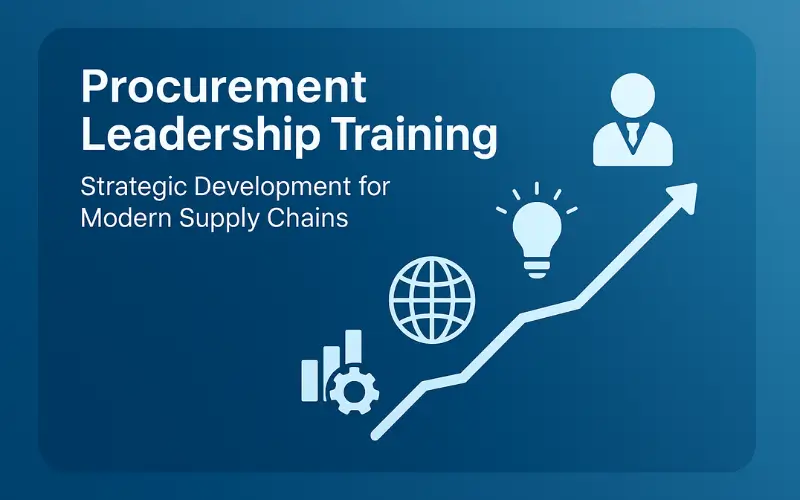Modern procurement leaders face challenges that would have been unimaginable just a generation ago. They must understand artificial intelligence and machine learning applications, navigate geopolitical risks that can disrupt global supply chains overnight, and implement sustainability initiatives that align with corporate social responsibility goals. The complexity of these responsibilities demands a new approach to professional development that combines technical expertise with strategic thinking and leadership capabilities.
Skills for a Digitally Transformed, Globally Connected Landscape
Organizations across industries are recognizing that their procurement teams require more than on-the-job experience to excel in today’s environment. The most successful companies are investing heavily in structured development programs that build both functional skills and leadership competencies. These initiatives recognize that procurement professionals need to influence stakeholders across the organization, manage complex vendor relationships, and drive innovation through strategic sourcing decisions.
The digital transformation of procurement has created new skill requirements that traditional training programs often fail to address. Professionals must understand data analytics platforms, artificial intelligence applications, and blockchain technology while maintaining expertise in contract negotiation, supplier evaluation, and risk management. This broad skill set requires carefully designed educational programs that balance technical training with practical application.
Cross-functional collaboration has become essential for procurement success, yet many professionals lack the interpersonal skills necessary to work effectively with diverse teams. Modern procurement leaders must partner with finance teams on budget planning, collaborate with operations on supply chain optimization, and work with legal departments on contract structures. These interactions require communication skills, emotional intelligence, and the ability to translate procurement concepts for non-procurement audiences.
Strategic Competencies for Risk, Ethics, and Global Sourcing
Risk management capabilities have become increasingly critical as supply chains grow more complex and interconnected. Procurement professionals must identify potential disruptions, develop mitigation strategies, and maintain business continuity during crises. The COVID-19 pandemic highlighted the importance of these skills, as organizations with well-trained procurement teams were better positioned to navigate supply shortages and vendor challenges.
Sustainability and ethical sourcing have emerged as core competencies for procurement professionals. Organizations face increasing pressure from consumers, investors, and regulators to demonstrate responsible supply chain practices. This requires procurement teams to evaluate vendors based on environmental impact, labor practices, and social responsibility metrics while maintaining cost and quality standards. Procurement leadership training programs are incorporating these considerations as fundamental rather than supplementary skills.
Technology adoption in procurement continues to accelerate, with artificial intelligence, robotic process automation, and advanced analytics becoming standard tools. However, technology implementation success depends heavily on human expertise and change management capabilities. Procurement professionals must understand not just how to use these tools, but how to lead their organizations through digital transformation initiatives.
Global sourcing strategies require cultural competency and international business acumen that many procurement professionals lack. Working with suppliers across different countries involves understanding regulatory environments, cultural norms, and communication styles. Professional development programs must address these global competencies to prepare procurement teams for international supply chain management.
The Future of Procurement Leadership and Organizational Impact
Vendor relationship management has evolved from transactional interactions to strategic partnerships that drive mutual value creation. Procurement professionals must develop skills in relationship building, performance management, and collaborative problem-solving. These capabilities require both technical knowledge of contract structures and soft skills in communication and negotiation.
Data-driven decision making has become fundamental to procurement success, yet many professionals lack the analytical skills necessary to extract insights from complex datasets. Modern procurement leaders must understand statistical analysis, trend identification, and predictive modeling while communicating findings effectively to senior leadership and other stakeholders.
The procurement profession’s evolution toward strategic importance within organizations has created significant career advancement opportunities for well-prepared professionals. However, realizing these opportunities requires continuous learning and skill development that keeps pace with changing business requirements and technological capabilities.
Organizations that invest in comprehensive professional development for their procurement teams consistently outperform competitors in cost management, supplier performance, and operational efficiency. These results demonstrate that procurement training is not an expense but a strategic investment that delivers measurable returns through improved supply chain performance and organizational resilience.
As procurement continues to evolve, the professionals who embrace continuous learning and skill development will shape the future of supply chain management and drive organizational success in an increasingly complex global marketplace.




